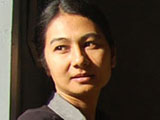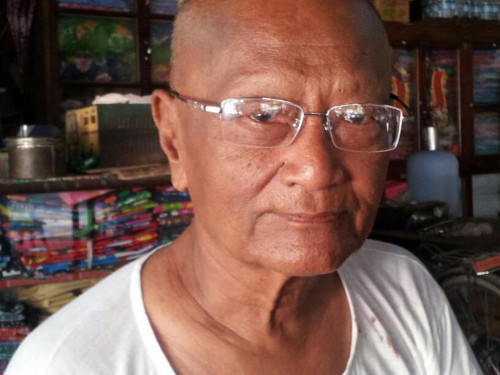Ko Lay (Inn Wa Gone Yi): A Commander of Poetry
A once-banned poet is free to publish and work for peace in Burma.
There are four poets from Mandalay University, which is in middle Burma, who have been named “poetry commanders,” meaning that they lead the fight to defend poetry. Ko Lay (Inn Wa Gone Yi) is one of them.
While studying at Mandalay University, Ko Lay was the University Hostel’s librarian and also joined the Mandalay University Writers’ Club. He has been writing poetry since he was a student there. Later he won the National Literary Award for his poetry book Lan Thit (New Road).

- In Burma if you want to hear about issues the newspapers can’t talk about, you should go to a tea shop. Tea houses were where I used to meet with other activists, writers and artists, as well as where I built friendships. Within tea houses we talked about Burmese writers, literary trends we noticed, and, of course, politics. This online space attempts to emulate the conversations I enjoyed in Rangoon’s tea houses.

- Khet Mar is a journalist, novelist, short story writer, poet, and essayist from Burma. She is the author of one novel, Wild Snowy Night, as well as several collections of short stories, essays and poems. Her work has been translated into English and Japanese, been broadcast on radio, and made into a film. She is a former writer-in-residence at City of Asylum/Pittsburgh.
Because of this, most people from my generation have heard Ko Lay’s name, even if they haven’t seen him in person. Many people my age have also read his poems from Lan Thit in their high school textbooks. As for me, I was lucky enough to get to know Ko Lay as I was becoming a writer. Whenever I went to Mandalay, I tried to see Ko Lay, who is a happy and friendly man.
When the National League for Democracy Party (NLD) was founded in 1988, Ko Lay was supported by the NLD as a member of the “intellectual group.”
In the past, the NLD generally celebrated political holidays, including Independence Day, Union Day, and Martyr’s Day, by holding a big literary event featuring talks and performances. Among those events, the one scheduled for National Day was slightly different from the others in that the participating speakers were the same every year. Those speakers were the poets Kyi Aung and Ko Lay.
But after 1995, military intelligence officers began harassing the poets who came to Yangon to participate in the NLD’s National Day literature festivities. The military tried to restrict the poets’ travel plans and their ability to stay in Yangon. They ordered the poets not to stay anywhere besides the places that had been arranged, not to go anywhere besides the places they had been given permission for, and not to do anything besides what the military had already agreed to allow them do.
The worst part about this was that, because of their involvement with the NLD, both Ki Aung and Ko Lay’s writings were banned after 1995, and even their names could not be mentioned in any books. None of Kyi Aung’s poetry was printed until after he died in 2009; he did not get to see any of his work in book form. Ko Lay, on the other hand, was able to print his poetry again after 2010, when President Thein Sein came to power. But by the time he received this permission, he was already 75 years old.
Although the printing of Ko Lay’s work was banned for over a decade, he doesn’t hold any antipathy towards the authorities. Instead, Ko Lay has said that “we will take a step down” to work alongside the military for the good of Burma’s people.
It should be clear that Ko Lay is concerned for Burma, a country that still sees fighting with armed ethnic groups, even though the nation’s leaders have said, “the country is going toward a democratic country.” Ko Lay urges all people to work towards peace together.
“I am already 75,” he has said. “I have heard gunfire throughout those 75 years. So now I am planning to found a group to work for peace. I hope we will have peace soon. If the government is lead by the president and the military and all political parties work together for peace, we will find success.”
In January Ko Lay won a Tawphayarlay Literary Award for his book By Noontime. The poems in that book were written between 1965 and 1991.
Although Ko Lay’s poetry could not be legally printed for over decade, I don’t think it was the case that he didn’t write anything at all during that period of censorship. Personally, I would like to read the poetry that he wrote after 1995, which, so far, we can’t read in any book.
Translated by Courtney Wittekind.






One Comment on "Ko Lay (Inn Wa Gone Yi): A Commander of Poetry"
I am very proud of Ko Lay (Innwa Gonyi) who has been described in such an online magazine on literature,free speech and social justice, SAMPSONIA WAY !
I am also very happy for this photo of Ko Lay I have taken for him for the profile picture of Facebook !
Millions thanks, the author of this article Khet Mar!